Covid-19: How did a volunteer panel react when we showed them an anti-vax video?
- Published
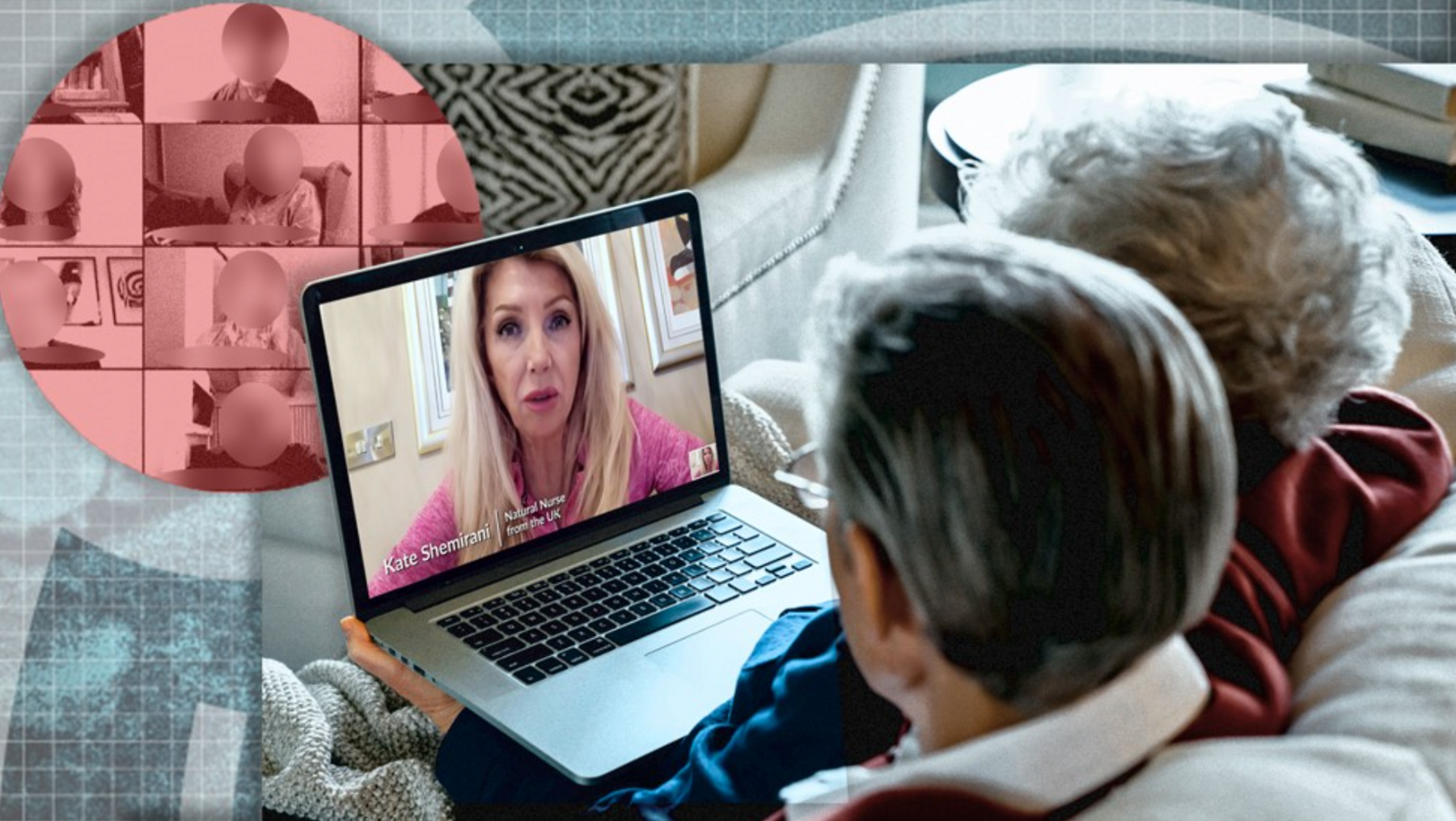
A screengrab from a video called Ask the Experts
Activists have been targeting people with fears about vaccines in a social media blitz. In an experiment, BBC Panorama showed a panel one video filled with falsehoods to see how it affected their willingness to get a jab.
In a sleepy suburb of Norwich, 83-year-old Rosemary opens a WhatsApp message from a relative.
It contains a video called Ask the Experts.
The clip features people with impressive medical and scientific titles based in the UK, US, Spain and Sweden.
Some allege, contrary to the evidence, that Covid-19 vaccines are unsafe, that they can alter a person's DNA - and even that the pandemic is somehow not real.
Rosemary is frightened - and suddenly unsure about whether she'll get vaccinated.
"It sounded so real and the people were so plausible and they were named as clinicians and doctors," she says.
With the majority of the elderly and at-risk groups having had their jabs, the next big challenge for the government is to vaccinate everyone else in the UK.
Most people say they want a jab, but the latest anti-vaccine tactics deployed by a committed minority seek to exploit people's nervousness.
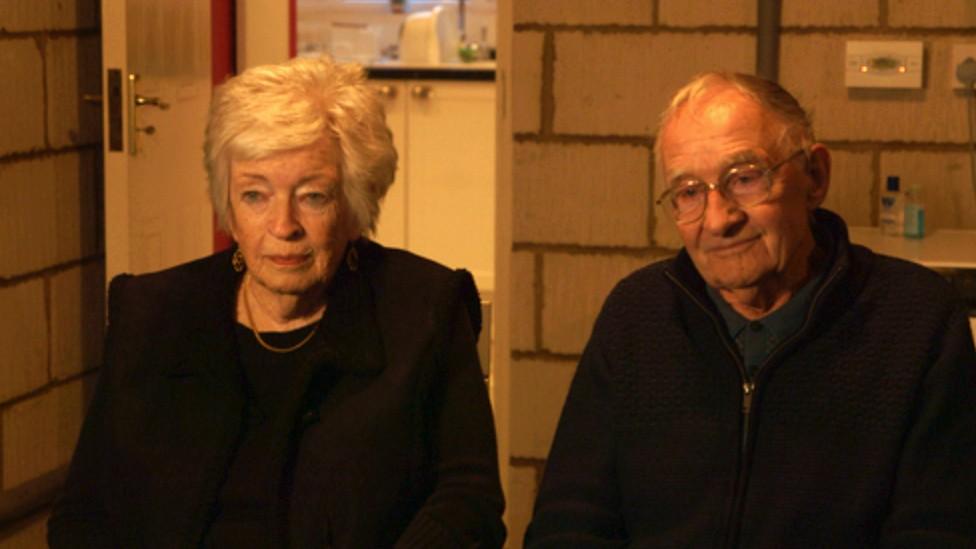
Rosemary and her husband Donald were concerned about the video they received via WhatsApp
Deliberate tactics
Rosemary is just one of millions exposed to tactics used by anti-vaccine activists - a loose collection of people who make a variety of claims about vaccines, including suggesting they are dangerous and a form of state control.
Over the course of 27 minutes, the Ask the Experts video relentlessly introduces 33 people, many brandishing their credentials, often sitting in what look like medical consultation rooms.
They confidently and calmly repeat similar messages - although many of the claims are misleading or just plain untrue.
Rosemary was left shocked as these people - who looked similar to the doctors she would usually turn to for sound advice - said that Covid-19 was "not a real medical pandemic", that vaccines alter your DNA, that they cause infertility and that they're part of a deliberate global plan to hurt people.
She's not alone in being scared by the video.
One London council has issued a warning after the Ask The Experts video started circulating in Asian and black communities.
These groups have been disproportionately affected by coronavirus - and there are indications that some ethnic minority groups have a higher level of reluctance when it comes to Covid-19 vaccines.
"The fact that they are targeting it at those communities will mean that there will be people who die as a result of not having the vaccine," says Westminster council leader Rachael Robathan.
Despite being removed from YouTube, Twitter and Facebook, it's been claimed that Ask the Experts has been seen more than 250,000 times.
It's gone viral on WhatsApp and its producers have been asking for donations via PayPal.
Social media boom
The video is just one part of an online anti-vaccine blitz.
Exclusive research by BBC Monitoring has found a huge increase in followers of social media accounts promoting anti-vaccine material during the pandemic.
These aren't accounts asking legitimate medical questions - but people and organisations who've already made up their minds against vaccinations, and are manufacturing evidence or twisting facts to support their conclusions.
On Instagram, the number of followers of major anti-vaccination accounts increased nearly five-fold in 2020, to more than four million.
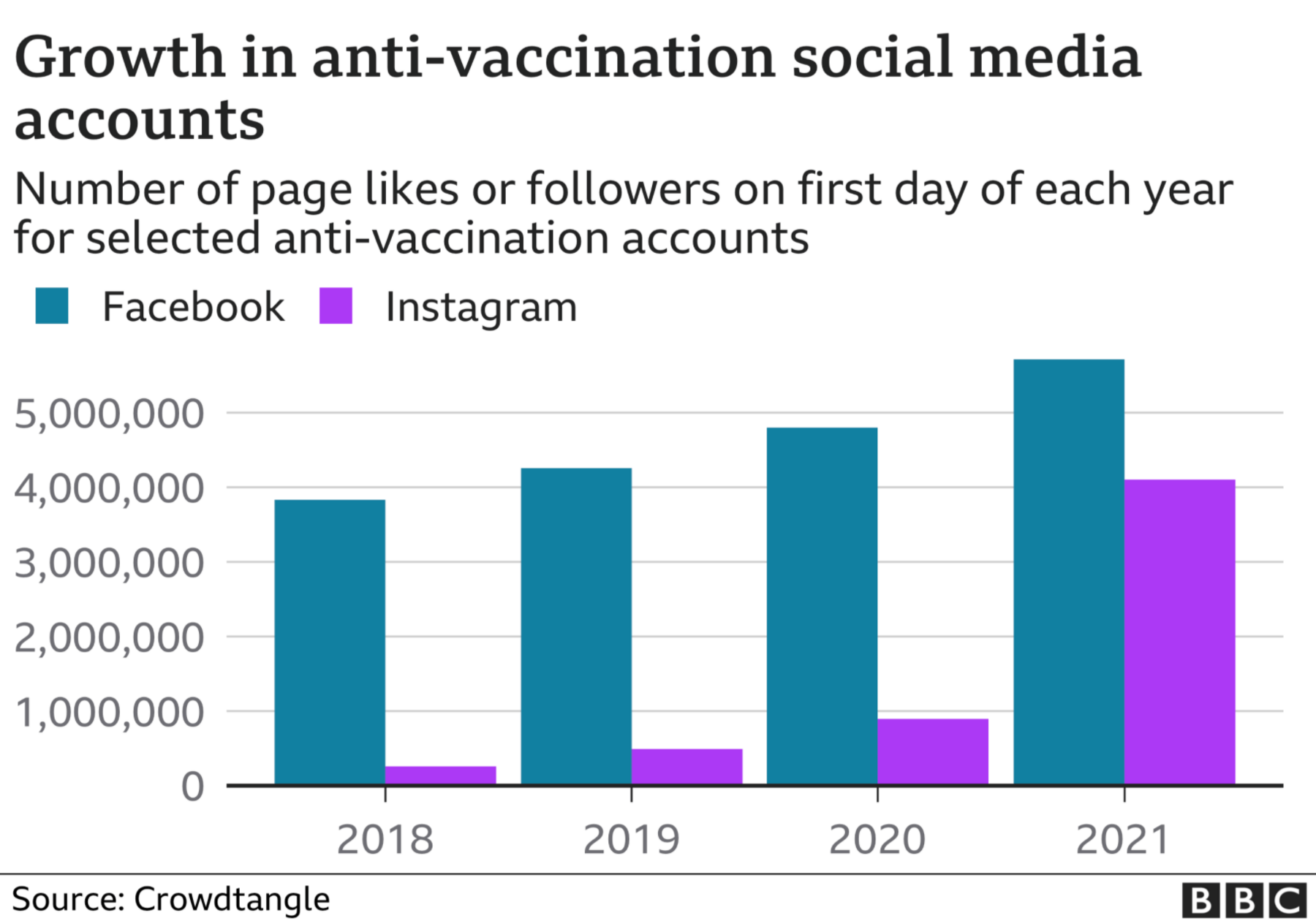
On Facebook, the top anti-vaccination pages grew by 19% in the last year and followers of Twitter accounts sharing anti-vaccine claims almost trebled.
The increases came alongside a huge overall surge in people seeking out health information online due to the pandemic. But the raw numbers still mean false anti-vaccine claims are reaching millions more than ever before.
Testing the impact
How do the misinformation and conspiracy theories pushed by the video affect the views of people who have legitimate questions about vaccines?
I ran a test for BBC Panorama. Our team assembled a panel of eight people from across the country who were unsure about having a Covid-19 vaccine.
Logging on to a Zoom call on a January evening, they view the Ask the Experts video as we observe their reactions.
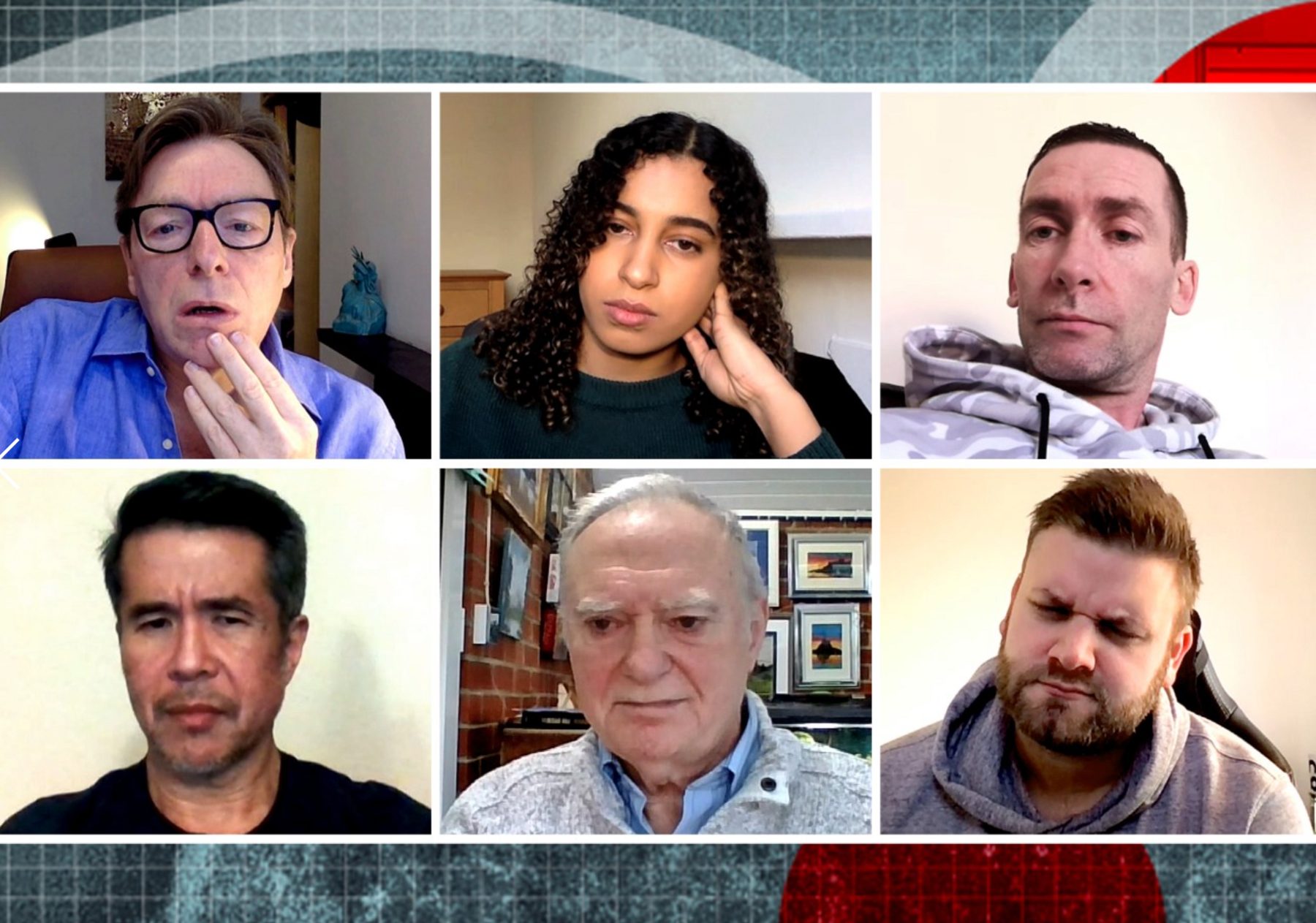
Six of the eight people who volunteered to watch the anti-vaccine film
Our experiment happens under the watchful eye of Dr Liam Smeeth, a professor of epidemiology at the London School of Hygiene and Tropical Medicine who's also a GP.
Rob - a 27-year-old volunteer radio DJ in Norfolk who's spending the latest lockdown trying to raise people's spirits with music - questions the speed of vaccine trials.
It's a concern shared by 20-year-old law student Phoebe, who has other worries.
"Every time I search about the Covid vaccine and fertility, it literally changes, so often it's quite overwhelming," she says.
Experts say that the coronavirus vaccines have gone through the same rigorous process as other vaccines - and there's no biological mechanism by which it could affect fertility.
After expressing their concerns, the panel begins watching Ask the Experts. I didn't tell them what the video was about - and reactions vary.
Eddie, a 76-year-old from Northumberland, furrows his brow in front of a backdrop of watercolours he's painted during lockdown.
"I thought at first 'Are these actors? Is this just a sham?'" he says. "And as I went on, I realised that they were real."
Another person in the video appears wearing a white lab coat, pictured in what looks like a hospital.
Matt - a 31-year-old who works in IT - nods along, listening attentively.
"I feel I could trust some of them," he says, eyes glued to the screen.
But the footage turns off others.
As one of the people in the video argues, with an air of authority, that this is "not a real medical pandemic", Russell from Norwich puts his head in his hands. He was ill with coronavirus last year.
"Blimey! It's like being hit over the head a number of times. For half-an-hour," he says. "I feel like I'm being brainwashed."
Phoebe, the law student, also senses she's being fed misinformation. She crumples her face in disgust.
"If these people are saying the virus isn't real, I'm less inclined to believe what they say about the vaccine being dangerous," she says.
However, after watching the video half of the group says they are more worried about having a Covid-19 vaccine than before.
"It's being rushed, and there hasn't been too much information," says decorator Steven from Inverness, who has had cancer. "I do agree with all that part of it."
Shaun, who's a chef, was also swayed.
"The video says what I've had in the back of my mind," he says, running his hand through his hair as he tries to make sense of what he has just watched.
Dr Smeeth's main fear, that the video would amplify people's pre-existing fears, has materialised.
He wants any doctor or professional promoting false claims to face disciplinary action.
"I would certainly be very pro them being investigated and any evidence of harm being looked at," he says, "and them being stopped from using their title."
What happened next?
We have one more question - in the face of bad health information, can accurate advice from a respected expert increase trust in science?
One by one, Dr Smeeth tackles the concerns raised by the panel. The vaccine doesn't change your DNA, he explains. It has been through animal trials, and there's no biological mechanism by which it would affect your fertility, he adds.
After the discussion, all our volunteers say they're leaning towards having the vaccine. And some are even enthusiastic.
"I will definitely have it now," says Eddie, the painter from Northumberland, chuckling as he logs off.
Changing minds
Back in Norwich, once Rosemary also realised that many of the claims made in the video were false, she made her decision.
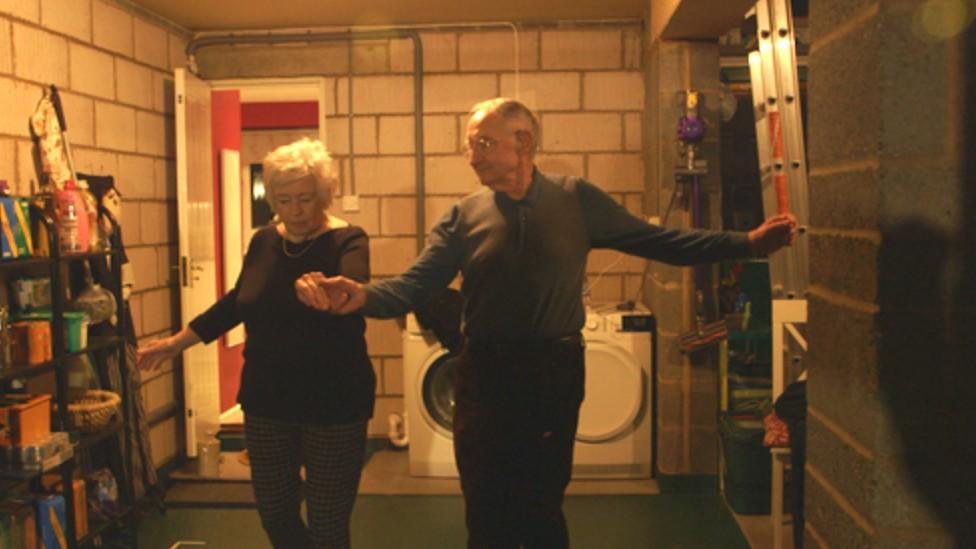
Rosemary and Donald met 60 years ago out dancing. During the pandemic they have made do, dancing the cha cha cha in their garage
"I'm so relieved to be getting the vaccine," she told me as her husband Donald prepared to visit their local GP.
Panorama contacted all 33 people in the video. Eleven responded - four defended the video's contents, five said if we referred to them as anti-vaccine they'd take legal action, and one made no comment. Another acknowledged the virus is real and causes diseases and deaths, but said the measures to manage the pandemic are disproportionate.
Panorama invited Oracle Films, which produced the video, to comment. The filmmakers chose not to.
After Panorama contacted PayPal about the request for donations, its account was taken down.
Facebook - which also owns WhatsApp and Instagram - removed a number of the pages and posts flagged by Panorama. The company says it continues to step up its enforcement policies about harmful misinformation and actively points people towards credible information.
Twitter gave us a similar statement and said it's prioritising the removal of Covid-19 content that could potentially cause harm.
But the Ask the Experts video is still in circulation on WhatsApp - one of thousands of videos and posts by anti-vaccine activists, who are still fighting to scare people away with false claims.
Watch Panorama, Vaccines: The Disinformation War in the UK only, on BBC One, Monday 15 February at 19:30 GMT or later after broadcast on BBC iPlayer.